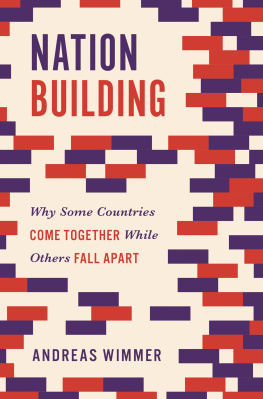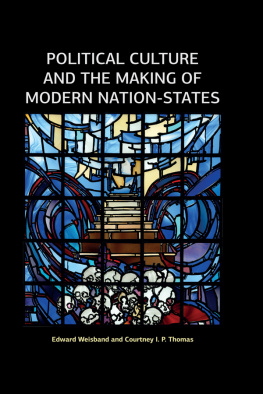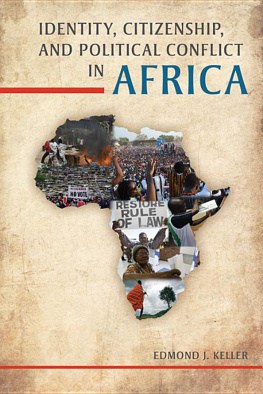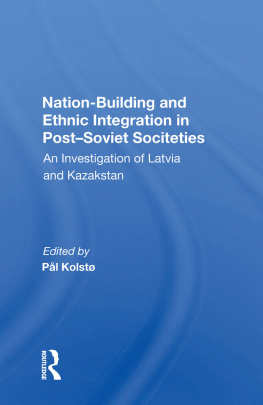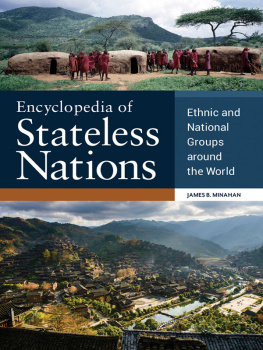
NATION BUILDING
Princeton Studies in Global and Comparative Sociology
Andreas Wimmer, Series Editor
Nation Building
Why Some Countries Come Together While Others Fall Apart
Andreas Wimmer
PRINCETON UNIVERSITY PRESS
PRINCETON AND OXFORD
Copyright 2018 by Princeton University Press
Published by Princeton University Press,
41 William Street, Princeton, New Jersey 08540
In the United Kingdom: Princeton University Press,
6 Oxford Street, Woodstock, Oxfordshire OX20 1TR
press.princeton.edu
Jacket design by Amanda Weiss
All Rights Reserved
ISBN 978-0-691-17738-0
Library of Congress Cataloging-in-Publication Data
Names: Wimmer, Andreas, author.
Title: Nation building : why some countries come together while others fall apart / Andreas Wimmer.
Description: Princeton, NJ : Princeton University Press, 2018. | Series: Princeton studies in global and comparative sociology | Includes bibliographical references and index.
Identifiers: LCCN 2017009584 | ISBN 9780691177380 (hardback)
Subjects: LCSH: Political development. | BISAC: SOCIAL SCIENCE / Sociology / General. | POLITICAL SCIENCE / Political Ideologies / Nationalism. | POLITICAL SCIENCE / Peace. | SOCIAL SCIENCE / Research. | PHILOSOPHY / Political. | SOCIAL SCIENCE / Statistics.
Classification: LCC JC336 .W56 2018 | DDC 320.1dc23 LC record available at https://LCCN.loc.gov/2017009584
British Library Cataloging-in-Publication Data is available
This book has been composed in Adobe Text Pro
Printed on acid-free paper.
Printed in the United States of America
10987654321
To my father, finally
CONTENTS
FIGURES
TABLES
A NOTE TO THE READER ON THE ONLINE APPENDIX
The two online appendix figures show, for each country, how the two main aspects of nation building have evolved over time: the population share of ethnic groups not represented in national government (measuring the political integration aspect of nation building) and the degree to which citizens are proud of their nation (referring to the identification aspect). The online material can be found at http://press.princeton.edu/titles/11197.html
PREFACE
I grew up in a small town on the river Rhine in Northern Switzerland, just south of the border with Germany. This border sometimes follows the river, sometimes trails off north of it, and sometimes circles around small enclaves of German territory surrounded by Swiss lands. The medieval patchwork of small principalities and ecclesiastical domains dissolved, from the 16th to the 19th centuries, into two nation-states without the wars that produced more clear-cut frontiers elsewhere in Europe. Hence the zigzag pattern of todays border.
As adolescents, we would pole wooden punts up the Rhine, looking for a riverfront clear of trees to make a fire, where we would roast a chicken or pork shoulder steaks, play Bob Dylan or bossa nova songs on the guitar, and drink cheap Chianti from a carboy. Sometimes we heard someone breaking through the woods making his way toward the shore; unsure on which side of the border we were, we would have to wait to see the guards uniform to discover whether he was Swiss or German. The guards often came for a little chat and never asked for papers. While the World War II bunkers on the Swiss side of the river reminded us of a different and not so distant past, the national boundaries along which we grew up seemed to be rather irrelevant.
In many ways, this was also true of the ethnic boundaries within Switzerland. When politics entered the adolescent mind, it was never about the relationship between French, German, and Italian speakers who populate the different parts of the country. Had we been raised in Belgium, Canada, or Spain, it would certainly have been different. In middle school, we debated feminist, social-democratic, and conservative views, often quite vehemently. Later on, various Trotskyist, Maoist, Protestant Fundamentalist, and Hippie Christian groups appeared on the high school terrainnobody cared much about ethnic identities, and certainly no one thought that any major political issue was related to our shared ethnic background as German-speaking Swiss.
The newspapers were full of stories about the results of the latest ballot votesSwitzerland is a direct democracy. But there was not much to report in terms of ethnic politics: not a single political party claims to represent one of the three ethnolinguistic groups, no political movements were in sight that would rally French or German speakers around a common cause, and everybody took it for granted that when a minister in the central government would have to be replaced, the overall balance between language groups would be maintained. Occasionally, there would be concerns raised and complaints voiced when national votes on ballot initiatives would coalesce along linguistic dividesFrench speakers usually voting in more government-friendly, less anti-immigrant, more Europe-oriented ways than the Alemannic- or Italian-speaking cantons. But the next vote would usually diffuse the situation with a different pattern of alignment. In short, ethnic difference simply didnt matter all that much in the political arena.
So much did I take this state of affairs for granted that it appeared puzzling, once becoming more aware of the outside world, that so much political conflict around the globe was fought along ethnic divides. What was wrong with Flemish and Walloon speakers in Belgium that they seemed to get at each others throats all the time? How could Protestants in Northern Ireland think of Catholics as second-class citizens to be kept in check with the police baton? Why did Serbs in Bosnia fight a brutal war to join their ethnic brethren east of the Drina river that separates Bosnia from Serbia proper? Who in their right mind would ever think that a system such as apartheid, where the white minority ruled over the black majority like an internal colony, could be justified or work? Why didnt others simply deal with ethnic difference in a normal, that is Swiss, way?
Later on, this rather nave puzzlement gave way to a more systematic search for answers. As a student of anthropology and later sociology, I wanted to understand why certain countries came together across ethnic divides, granting political representation in national government to groups small and large. Why did others not arrive at a similarly inclusive arrangement but resembled, in the extreme, the racial ethnocracy of South Africa? Why were others, like Belgium, at the brink of falling apart along ethnic fault lines? Why had still others, such as Iraq, already descended into conflict and war? Was this a matter of historywhether a countrys diverse groups joined together voluntarily to form a common state, as in Switzerland, or whether one group had historically dominated the others after conquest, as in South Africa? Was it a matter of democracySwitzerlands or Indias long record of peaceful elections explaining why minorities have a say in national-level politics there? This intellectual challenge has kept me busy for two decades, and I have pursued it across the disciplinary terrains of anthropology, sociology, and political science, and with a variety of methods, from large-N statistics to fine-grained historical case studies.
A series of books have resulted from this endeavor, and this isI hopethe last one in what has now become a quadrilogy. It addresses some of the puzzles left unsolved in the previous three books. In Nationalist Exclusion andEthnic Conflicts (2002), I argued that nationalist principles of political legitimacythe idea that government should rule in the name of a nationally defined people rather than God or dynastyradically changed the meaning of ethnic, racial, or national boundaries. New political hierarchies between such groups emerged to replace older forms of stratification such as estates. To show that this was the case everywhere around the world, I discussed a set of countries that had as little in common as possible: Switzerland, Iraq, and Mexico.
Next page
